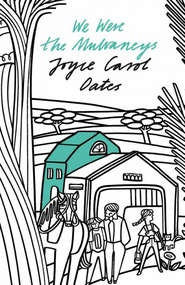По всем вопросам обращайтесь на: info@litportal.ru
(©) 2003-2025.
✖
Mudwoman
Автор
Год написания книги
2018
Настройки чтения
Размер шрифта
Высота строк
Поля
Having her period. Poor Meredith!
Everything shows in her face. Funny!
Early that morning before Carlos arrived—for M.R. had slept only intermittently through the night—she’d showered, of course, shampooed her hair. So long ago, seemed like another day.
And so another shower, back at the hotel. When she returned.
On the interstate M.R. was making good time in the compact little vehicle. Her speed held steady at just above sixty miles an hour which was a safe speed, even a cautious speed amid so many larger vehicles hurtling past her in the left lane as if with snorts of derision.
But—the beauty of this landscape! It required going away, and returning, to truly see it.
Farmland, hills. Wide swaths of farmland—cornfields, wheat—now harvested—rising in hills to the horizon. She caught her breath—those flame-flashes of sumac dark-red, fiery-orange by the roadside—amid darker evergreens, deciduous trees whose leaves hadn’t—yet—begun to die.
Already she was beyond Bone Plain Road, Frozen Ocean State Park. Passing signs for Boontown, Forestport, Poland and Cold Brook—names not yet familiar to her from her girlhood in Beechum County.
These precious hours! If her parents knew, they’d have wanted to see her—they’d have been willing to drive to Ithaca for the evening.
They’d have wanted to hear her keynote address. For they were so very proud of her. And they loved her. And saw so little of her since she’d left Carthage on that remarkable scholarship to Cornell, it must have perplexed them.
“I should have. Why didn’t I!”
It was as if M.R. had not thought of the possibility at all. As if a part of her brain had ceased functioning.
That peculiar sort of blindness/amnesia in which objects simply vanish as they pass into the area monitored by the damaged brain. Not that one forgets but that experience itself has been blocked.
Now that M.R. had assistants, it was no trouble to make such arrangements. At the hotel, for instance. Or, if the conference hotel was booked solid, at another local hotel. Audrey would have been delighted to book a room for M.R.’s parents.
M.R.’s lover had heard her speak in public several times. He’d been surprised—impressed—by her ease before a large audience, when M.R. was so frequently uneasy in his company.
Well, not uneasy—excited. M.R. was frequently so excited in his company.
She couldn’t bring herself to confess to her (secret) lover that intimacy with him was so precious to her, it was a strain to which she hadn’t yet become accustomed. She’d said with a smile No speaker makes eye contact with his audience. The larger the audience, the easier. That is the secret.
Her lover imagined her a far more composed and self-reliant individual than she was. It had long been a fiction of their relationship, that M.R. didn’t “need” a man in her life; she was of a newer, more liberated generation—for her lover was her senior by fourteen years, and often remarked upon this fact as if to absolve himself of any candidacy as the husband of a girl “so young.” Also, Andre was enmeshed in a painful marriage he liked to describe as resembling Laocoön and sons in the coils of the terrible sea-serpents.
M.R. laughed aloud. For Andre Litovik was so very funny, you might forget that his humor frequently masked a truth or a motive not-so-funny.
“Oh—God …”
Powerful air-suction from a passing/speeding trailer-truck made M.R.’s compact vehicle shudder. The trucker must have been driving at eighty miles an hour. M.R. braked her car, alarmed and frightened.
She’d been daydreaming, and not concentrating on her driving. She’d felt her mind drift.
Better to exit the interstate onto a state highway. This was safer, if slower. Through acres of steeply hilly farmland she drove into Cortland County, and she drove into Madison County, and she drove into Herkimer County and into the foothills of the Adirondacks and at last into Beechum County where mountain peaks covered in evergreens stretched hazy and sawtoothed to the horizon like receding and diminishing dreams.
She’d planned to drive north for only an hour and a half before turning around but decided now that a few minutes more—a few miles more—would do no harm.
Wherever she found herself at—4:30 P.M.?—she would stop at once, turn her car around and head back to Ithaca.
This was likely the first time in months that no one on M.R.’s staff knew where she was, at such an hour of a weekday. No friends knew, no colleagues. M.R. had passed into the blind side of the brain, she’d become invisible.
Was this a good thing, or—not so good? Both her parents had praised her as a girl for her maturity, her sense of “responsibility.” But this was something different, a mere interlude.
This was something different: no one would ever know.
She’d turned off her cell phone. More practical to take messages and answer them in sequence.
And what relief, to have left her laptop behind on the hotel bed! She was attached to the thing like a colostomy bag. Her senses reacted in panic if it appeared to be malfunctioning for just a few minutes. A flurry of e-mails buzzing in her wake like angry bees.
Belatedly M.R. remembered—she was supposed to meet with a prominent educator now chairing a national committee on bioethics who’d been asked to invite M.R. to join the committee. This was a committee M.R. wanted to join—nothing seemed to her more crucial than establishing guidelines on bioethics—yet somehow, she’d forgotten. In her haste to rent a car and drive up into Beechum County, she’d forgotten. And M.R. had scheduled their meeting-time herself—just before the reception, at 5 P.M.
She might have called the man to postpone their meeting to the next day but she didn’t have his cell phone number. Nor did she want to call her assistant Audrey to place the call for her for Audrey would naturally inquire where M.R. was and M.R. could not possibly tell her—“Just crossing the Black Snake River, up in Beechum County.”
Audrey would have been speechless. Audrey would have thought that M.R. must be joking.
Now in Beechum County M.R. switched on the car radio. She hoped to tune in to a Watertown station—WWTX. Once an NPR affiliate but now M.R. couldn’t locate it on the dial only just deafening patches of rock music and advertisements—the detritus of America.
On one FM station there appeared to be news—news from Washington—but static swept it away like ribald laughter.
News from Washington—but the U.S. Congress wouldn’t yet be voting on the war resolution, would it? This was too soon. There had to be days yet of debate.
M.R. couldn’t quite believe that legislators in Washington would authorize the bellicose Republican president to wage war against Iraq—this would be madness! The U.S. hadn’t entirely recovered from the debacle of the Vietnam War of which little ambiguity remained—the war had been a terrible mistake. Still, excited war rumors in the media—even the more liberal media like the New York Times—flared and rippled like wildfire in dried brush. There was a terrible thrillingness to the possibility of war.
It was astonishing how effectively the administration had lied to convince the majority of the American public that there was a direct link between Iraq and the terrorist attacks of 9/11. For since that catastrophic episode a near-palpable toxic-cloud was accumulating over the country, a gradual darkening of logic—an impatience with logic.
Madness! M.R. could not think of it without beginning to tremble.
She was an ethicist: a professional. It was criminal, it was self-destructive, it was cruel, stupid, quixotic—unethical: waging war on such flimsy pretexts.
What was the appeal of war?—the appeal of a paroxysm of sustained and collective violence repeated endlessly, from the earliest prehistory until the present time? It was not enough to say Men are bred to war, men are warriors—men must perform their role as warriors. It was not enough to say Humankind is self-destructive, damned. Of all the species, damned.
As a liberal, as an educator, M.R. did not believe in such primitive determinism. She did not believe in genetic determinism at all.
Very likely she had young relatives scattered through Beechum County who were in the National Guard or in a branch of the armed services. Some might even now be stationed in the Middle East awaiting deployment to battle, as in the Gulf War of some years ago. Like the more southern Appalachian region Beechum County was the sort of economically depressed rural-America that provided fodder for the military machine.
M.R.’s immediate family—Agatha and Konrad—were Quakers, if not “active” in the nearest Friends’ congregation, which was some distance from Carthage. (“Too lazy to drive,” Konrad said. “You can ‘Quaker’ at any time and any place.”) None of the other Neukirchens were Quakers and certainly none were pacifists like Konrad who’d been granted the status of conscientious objector during the Korean War and instead of being incarcerated in a federal prison was allowed to work in a VA hospital in Baltimore.
Konrad was a kindly man, short and squat as a fireplug and fierce in declaring that if somehow he’d found himself in the army—in combat—he could never fire at any “enemy.” He could not even hold a gun, point a gun at anyone.
M.R. smiled, recalling her father. She was recalling Konrad not as he was at the present time—an aging ailing man—but as he’d been in her earliest memories, in the mid-and late 1960s.
The one thing they can’t make you do is kill another person. They can’t even make you hate another person.
There was a sign—CARTHAGE 78 MILES. But M.R. could not drive to Carthage today.
Uneasily she was thinking—is it time to turn back? Some instinct kept her from checking the time….
How strange she was feeling! This sensation she’d felt as a girl inching out—with other, older children—onto the frozen river; so darkly swift-flowing a river, like a black snake with glittering scales, that water froze only at shore and continued to rush along at the center of the stream.











